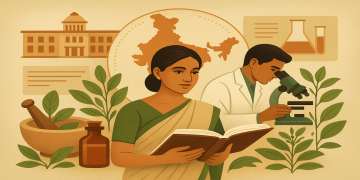Prof. Debabrata Das, Director of the International Institute of Information Technology Bangalore (IIITB), is steering the institute towards global prominence in education and research. With over two decades at IIITB, his journey from Assistant Professor to Director has shaped a vision rooted in innovation, inclusivity, and societal impact. In an insightful interview with Higher Education Magazine, Prof. Das discusses IIITB’s contributions to India’s Digital Public Infrastructure (DPI), its flagship Modular Open Source Identity Platform (MOSIP), and initiatives like Tele-MANAS, alongside his commitment to fostering student-driven innovation and global collaborations. His leadership positions IIITB as a catalyst for ethical, transformative technology solutions worldwide.
Q. You assumed the role of Director at IIIT Bangalore in 2021, succeeding Prof. Sadagopan. How did you navigate the transition, and what legacy do you aim to build upon while steering the institute into its next phase?
Since joining IIIT Bangalore in December 2002, my journey has been enriching and transformative. I have engaged in teaching, high-impact research, industry collaborations, and served on government advisory committees, shaping my academic outlook. Leadership roles, from managing placements and IT infrastructure to serving as Dean (Academics) and Dean (R&D), provided diverse perspectives on the institute’s ethos.
The 19 years before becoming Director were a period of intense learning and growth. Each role prepared me for greater responsibility, making the transition to Director in July 2021 a natural progression. My vision is to build on the strong foundation laid by the Governing Body, Senate, and my predecessor, elevating IIITB to international prominence. I aim to foster an environment of academic excellence, deployable research, and adaptability to global changes, positioning IIITB as a global leader in education and research.
Q. With over two decades at IIITB, how has your academic and administrative journey shaped your vision for the institute’s future?
My journey from Assistant Professor in 2002 to Director in 2021 has given me a deep understanding of IIITB’s academic ethos, research priorities, and operational dynamics. Progressing through roles like Professor and Dean of Academics and R&D instilled a holistic leadership approach. My focus on collaborative growth, mentoring students, and involving colleagues and staff has been central to my success.
This inclusive philosophy guides my vision to transform IIITB into a globally recognised hub of academic excellence and impactful research, with students as the cornerstone. I aim to build an economically and intellectually robust institution that drives innovation and societal progress.
Q. Could you share your thoughts on the institute’s role in advancing national digital initiatives like Aadhaar and UPI?
IIIT Bangalore is a key driver in advancing India’s Digital Public Infrastructure (DPI) through pioneering research, global collaborations, and open-source digital public goods. Our flagship project, the Modular Open Source Identity Platform (MOSIP), has enabled over 130 million digital identity registrations across 27 countries, showcasing India’s expertise in scalable, secure digital identity systems. The Centre for Digital Public Infrastructure (CDPI) and Centre for Open Societal Systems (COSS) support governments worldwide in designing DPI solutions using minimalist technology and open standards.
IIITB collaborates with countries like Morocco, Philippines, Ethiopia, and others to implement digital credentials for land management, promoting inclusive governance. Domestically, we partner with the Government of Karnataka on data-driven planning and digital governance, reinforcing our leadership in citizen-centric digital ecosystems.
Q. The Modular Open Source Identity Platform (MOSIP) has garnered global interest. How has IIITB’s contribution positioned the institute as a global thought leader in digital identity systems?
MOSIP has positioned IIIT Bangalore as a global thought leader by offering an open-source, scalable digital ID framework tailored to diverse national contexts. Over 130 million residents across 27 countries have registered using MOSIP, sparking a revolution in ethical, sovereign digital identity management. IIITB has also developed DPI products like INJI for data exchange and eSignet for single sign-on.
MOSIP’s philosophy prioritises data sovereignty, with ownership resting solely with governments. IIITB provides the technology and knowledge transfer, empowering nations to build secure digital ID ecosystems. My presentation at the Citizens Stacks Conference at the UN Headquarters in Geneva highlighted IIITB’s role in shaping global discourse on technology and inclusive governance, cementing its status as a pioneer in digital identity systems.
Q. The IIITB COMET Foundation is known for cutting-edge research. Could you elaborate on its recent initiatives and their alignment with India’s digital transformation goals?
The IIITB COMET Foundation is developing a 5G-Advanced base station compliant with global telecom standards, focusing on open radio access networks to foster indigenous telecom infrastructure. This aligns with India’s digital transformation by supporting critical government infrastructure on 5G networks. Additionally, COMET is working on reconfigurable intelligent surfaces (RIS) to address coverage gaps, offering cost and power savings while aligning with global 6G standards. These initiatives enhance connectivity and support India’s ambition to lead in next-generation telecommunications.
Q. With the Centre for Technology Research and Innovation for Digital Governance (CTRI-DG), how is IIITB reimagining citizen-centric governance through technology?
CTRI-DG focuses on software engineering research to address technological advancements in digital governance. AI and Machine Learning are transforming code generation, reducing development time and improving quality. CTRI-DG’s RASP platform for e-Governance application code is in beta testing and will soon be released, enabling faster, reliable development of citizen-centric digital solutions.
Q. The E-Health Research Centre’s work on Tele-MANAS with NIMHANS represents a vital intersection of mental health and digital innovation. What are the key outcomes and learnings?
The E-Health Research Centre (EHRC) collaborates with NIMHANS on Tele-MANAS, part of India’s National Tele-Mental Health Programme, offering free, round-the-clock mental health services. EHRC developed the scalable, secure digital platform powering this initiative.
Key Outcomes and Learnings:
Unmet Demand: Tele-MANAS handles 3,000 daily cases, surpassing 20 lakh calls, highlighting significant demand.
Scalable Infrastructure: Operating across 30+ states, it ensures instant access via a toll-free number.
Data Insights: Real-time analysis provides demographic and regional mental health insights.
Privacy and Safety: Built-in security encourages help-seeking without stigma.
Accessible Care: Professional guidance from home benefits those unable to visit centres.
Reducing Stigma: Normalising mental health services fosters a supportive society.
Policy Impact: Collaboration with NIMHANS shapes national digital health policies.
Tele-MANAS demonstrates how digital infrastructure can drive societal transformation.
Q. The Machine Intelligence & Robotics Centre of Excellence (MINRO) is a hub of advanced research. What are some standout projects and their societal impact?
MINRO conducts cutting-edge AI research, including:
Generative AI for Rural Aspirants: Helps rural students prepare for interviews without urban coaching, earning recognition from the President of India.
VLC-LE for Health Wearables: Develops low-energy Visible Light Communication for health data transmission.
Few-Shot Learning: Reduces training data needs for multi-lingual speech processing, focusing on Indian languages.
Assistive Technologies: Collaborates with EHRC to develop solutions for visually impaired and physically challenged individuals.
These projects empower communities, advance healthcare, and promote inclusive technology.
Q. IIITB’s Innovation Centre fosters student-driven startups. How do you ensure innovation is sustained and translated into viable solutions?
The IIITB Innovation Centre (IIITB-IC), established in 2009, supports student-driven innovation through:
Incubation Programmes: Tailored programmes like DEEEPAS (mental health), Fintech Pre-Incubation, and Atom (health & wellness) guide startups from ideation to market fit.
Mentorship: Cross-functional experts provide feedback and industry integration.
Events: Hackathons, design sprints, and workshops empower students to prototype solutions.
Success Stories: Startups like Pgfy demonstrate the centre’s ability to translate ideas into market-ready solutions.
IIITB-IC focuses on deep tech like IoT and Blockchain, contributing to Bengaluru’s startup ecosystem and India’s digital transformation.
Q. The Centre for IT and Public Policy encourages a ‘tech-for-good’ ethos. What advice would you offer aspiring professionals combining technology with public interest?
The Centre for IT and Public Policy (CITAPP) examines technology’s role in addressing societal challenges, focusing on digital identity, inclusion, and governance. My advice to aspiring professionals is to innovate with empathy, think systemically, and prioritise equity and ethics. Engage with communities, understand policy contexts, and design inclusive solutions that respect societal needs.
Q. What is your perspective on the evolving nature of academia-industry partnerships?
Industries face numerous R&D challenges, particularly with AI integration into IT and semiconductor products. Academia must focus on translatable research to foster win-win collaborations, accelerating impactful innovation.
Q. What inspires you as a researcher, educator, and leader in technology and innovation?
Teaching, research, and volunteering are my passions. Building the next generation with strong conceptual understanding and innovative skills inspires me. Seeing students succeed academically and in life is my greatest motivation.
Q. What defines impactful research in today’s academic ecosystem?
Impactful research trains students in fundamentals and future trends, encouraging them to solve unsolved problems with novel ideas. It should be translatable, contributing to societal upliftment.
Q. How do you view IIITB’s role in shaping global academic and research collaborations?
As Chairman of IEEE India Council (2023–2024) and Bangalore Section (2017), I leveraged IEEE’s platform to organise global conferences. IIITB’s contributions to standards expose students to product development processes, preparing them for niche R&D roles and enhancing global collaborations.
Q. How do you balance institutional leadership with national and global engagements?
I prioritise the nation, students, and IIITB, approaching tasks with passion and integrity. Family support and faith in the Divine provide balance and strength. Daily devotion brings clarity, reminding me I am a humble conduit serving society.
Prof. Debabrata Das’s leadership at IIIT Bangalore blends academic excellence with societal impact. From MOSIP’s global reach to Tele-MANAS’s mental health innovations, IIITB is a leader in ethical technology solutions. Through initiatives like the Innovation Centre and MINRO, Prof. Das nurtures innovators addressing global challenges. His vision ensures IIITB remains a beacon of progress, shaping a future where technology serves humanity equitably.




























































